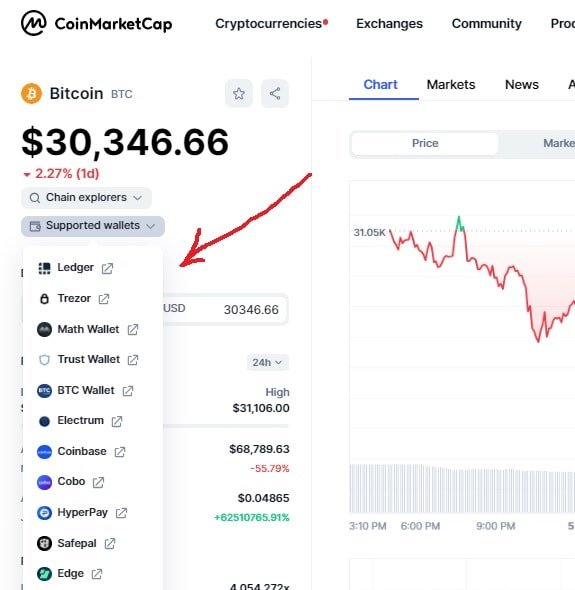Are you looking for a way to make financial transactions that are completely anonymous? Cryptocurrency may seem like the perfect solution. After all, it’s a digital currency created and stored on the internet – so surely any payments made with it must be untraceable, right?
Wrong!
Despite what you may have heard, cryptocurrency transactions can’t guarantee complete anonymity. Don’t worry though; we’ll explain how you can still maintain your privacy when using cryptocurrencies.
In this article, we’ll dive into the difference between pseudonymity and anonymity and examine how cryptocurrency transactions are traceable. We’ll also explore ways to make your crypto transactions untraceable and which cryptocurrencies offer truly anonymous payments.
Get ready to become an expert in cryptocurrency privacy!
TABLE OF CONTENTS
Are cryptocurrency transactions anonymous?

You might think cryptocurrency transactions are anonymous, but that’s not always the case.
Most cryptocurrencies employ a system of public and private keys to secure their transactions, but this doesn’t necessarily guarantee anonymity.
Depending on how you use cryptocurrency, your transaction could be linked to an address that reveals your identity.
Additionally, there are various government regulations and laws in place regarding cryptocurrency transactions that can expose your identity if you don’t take the necessary precautions.
For example, if you’re using a crypto exchange or wallet, it’s important to know what kind of information they require from customers when registering for an account.
Many exchanges have Know Your Customer (KYC) policies where customers must provide personal information such as name, address, date of birth, etc in order to use their platforms.
This data is then stored in the exchange’s database which may be accessible by law enforcement agencies with certain legal authority.
Also, the addresses you generate on an exchange are linked to your profile – your KYC’ed profile.
Despite these challenges to anonymity, there are still ways that users can keep their identities hidden while conducting crypto transactions.
For instance, some wallets provide users with additional layers of privacy such as IP masking services or multi-signature technology where multiple signatures are required before any transaction can be completed.
Additionally, most cryptocurrencies offer built-in features like ring signatures and stealth addresses which help to conceal user identity when making payments and transfers.
Overall, it is possible for individuals to maintain their anonymity when transacting with crypto, but it requires understanding how each coin works and taking extra steps like using privacy-enhancing features or mixing services to further obfuscate one’s financial activity online.
With careful consideration for security measures and a little bit of effort, anyone can remain anonymous while using digital currencies today!
Pseudonymity vs. Anonymity
Transaction of digital assets can provide a level of pseudonymity, rather than total invisibility. Cryptocurrency transactions are registered on a decentralized ledger, meaning that although the user’s identity is kept anonymous, it is still possible to trace the transaction back to an individual or group.
This creates what is known as ‘pseudonymity’, where one’s financial activity can be linked back to them through analysis of the blockchain record.
When compared to traditional banking systems, cryptocurrency offers a higher degree of privacy. The pseudonymity provided by cryptocurrency networks allows users to purchase goods and services without revealing their true identity. However, it’s important to note that there are still some risks associated with this kind of anonymity as certain transactions may be tracked if they’re conducted through an exchange or other third-party service provider.
Overall, while cryptocurrency does offer more privacy than traditional banking services, it can’t guarantee complete anonymity for its users.
It’s important for individuals engaging in cryptocurrency transactions to understand the risks and take precautions when making payments online or using exchanges.
By taking these steps and being mindful of how their activities could be traced back to them, users can maximize their protection against potential hackers or malicious actors seeking out personal information for nefarious purposes.
How is cryptocurrency traceable?
By utilizing a decentralized ledger, cryptocurrency users can still be traced back to their activities, despite the anonymity provided by the network.
Transactions made on any given blockchain are viewable by anyone with access to the network, and each transaction is associated with a unique public address which identifies the sender and receiver.
This means that even though users may appear anonymous when making transactions, they can still be identified if they use the same address for multiple transactions over time.
Additionally, forensic analysis of certain features of crypto transactions such as timing or denomination size can help determine links between addresses and therefore link users to activity on the blockchain.
As a result, it’s possible to trace transaction histories in an effort to identify those involved in certain activities – potentially revealing personal information about individuals who thought they were acting anonymously.
It’s also important to remember that while cryptocurrency networks provide privacy through encryption and pseudonymous addresses, these measures are not absolute protection from being tracked down by those determined enough.
Law enforcement officials often have resources that allow them to uncover any identifying information associated with a particular public address or wallet used during crypto transactions.
Cryptocurrency provides an alternative way for people to make payments securely without having their identity disclosed – but this doesn’t mean transactions are completely untraceable.
How Can You Search for A Crypto Wallet Address?
Hunting for a crypto wallet address can feel like searching for a needle in a haystack, yet with the right tools, you can find the hidden gems that you’re looking for.
The first step is to understand the different types of wallets available.
A hot or custodial wallet is used to store your funds in an exchange where it’s easier to buy and sell cryptocurrency.
On the other hand, a cold or non-custodial wallet gives you full control over your funds and requires extra security measures due to its lack of third-party protection.
Once you know what type of wallet you need, there are various ways of finding one that suits your needs.
Popular websites such as CoinMarketCap provide detailed information on each coin’s market capitalization and list all active wallets associated with them.

This makes it easier to narrow down your search by filtering out those not relevant to the coin you want.
Additionally, certain services like Block Explorer allow users to search through transactions recorded on public blockchains using an address or transaction ID (TXID). This allows them to check if their desired wallet has been used before and how much money was sent/received from it.
All this goes to show that with the correct knowledge and tools at hand, uncovering hidden crypto wallets isn’t impossible – just time-consuming!
How to make your transactions untraceable?
If you’re looking to make your cryptocurrency transactions untraceable, there are a couple of ways you can go about it.
One option is to use a cryptocurrency mixer, which randomly exchanges coins between multiple wallets, making it difficult to trace the origin of any transaction.
Another way is to create multiple crypto wallets and transfer funds between them. This makes it difficult for anyone trying to track where your money has gone.
Cryptocurrency mixer
Using a cryptocurrency mixer can help increase the anonymity of Bitcoin transactions, making it harder to trace them back to you.
A Bitcoin mixer works by combining transactions from different people into one pool, then sending those funds to the intended addresses. This makes it difficult for anyone trying to trace the transaction back to its origin.
By using a mixer, users can add additional layers of privacy and security when conducting crypto transactions.
Mixers also allow users to customize how their funds are distributed and even provide an extra layer of obfuscation that could make it impossible for anyone else to know where the money came from or who sent it.
The use of mixers is growing in popularity as more people become aware of its advantages over traditional methods.
Here’s a list with some of the most known Bitcoin Mixers:
| Mixer | Platform | Features | Minimum BTC | Confirmations Required |
|---|---|---|---|---|
| Unijoin | Web Browser/Tor | Pay as You Wish | 0.01 BTC | 3 blockchain confirmations |
| Sinbad.io | Web Browser/Tor | No registration | 0.001 BTC | 3 blockchain confirmations + up to 10 min |
| Mixero | Web Browser/Tor | No registration | 0.002 BTC | 1 blockchain confirmation – 2 hours |
| Yo!Mix | Web Browser/Tor | No registration | Uses predefined wallet | 1 blockchain confirmation |
| Coinomize | Web Browser/Tor | No registration | Varies | 1 blockchain confirmation within reasonable timeframe |
| CryptoMixer | Web Browser/Tor | Easy-to-use interface | Varies | 2 blockchain confirmations |
| AnonMixer | Web Browser/Tor | No registration needed | Advanced privacy features | 3 blockchain confirmations |
Creating many crypto wallets
Creating multiple crypto wallets can be like throwing a smoke bomb, helping you slip away under the radar and fly off into the sunset.
By creating many different wallets, it becomes much harder for anyone to trace transactions or keep tabs on your activities. This makes it difficult to track your spending habits and see where your money is going.
The more wallets you have, the more convoluted the trail of breadcrumbs will be, making it tough for anyone to follow. Plus, you can easily move funds between wallets in a matter of seconds without leaving any traces behind.
All this adds up to giving you plenty of privacy when dealing with cryptocurrencies.
Which cryptocurrency are truly anonymous?
You might be wondering which cryptocurrencies offer truly anonymous transactions. Some of the most popular options for private and untraceable transactions are Monero and Zcash.
Both of these digital currencies have implemented features that make it difficult to trace transactions back to individual users or wallets, ensuring a higher level of privacy.
Monero

Monero offers unparalleled privacy to its users, making it one of the most anonymous cryptocurrencies available. It uses advanced cryptography and ring signatures to ensure the user’s transactions remain untraceable and unlinkable.
Monero also has a special feature that sets it apart from other coins: Stealth Addresses. These are unique addresses for each transaction, allowing the receiver to provide a single address without compromising their privacy.
Here’s why Monero is so anonymous:
- Cryptography ensures that transactions are completely untraceable.
- Ring Signatures keep individual signatures hidden from public view while still being verifiable by miners in the network.
- Stealth Addresses create a unique address for every transaction made, giving the receiver more control over their data while remaining private and secure.
- The Monero blockchain is constantly evolving with new improvements designed to better protect user anonymity and security at all levels of operation.
Zcash

Zcash is the ultimate shield of privacy for those seeking total financial freedom. It wraps users in an impenetrable cloak of anonymity.
Unlike other cryptocurrencies, all Zcash transactions are encrypted using advanced cryptographic techniques called zero-knowledge proofs.
This ensures that transaction details remain anonymous and untraceable, providing a higher level of privacy than any other cryptocurrency on the market today.
Moreover, unlike Monero, Zcash does not require users to use a stealth address to hide their identity from others.
Instead, it uses its own special encryption algorithm to provide total anonymity. Additionally, users can opt-in for transparent addresses when they want to reveal their identity or need to comply with certain regulations.
All in all, Zcash provides unparalleled anonymity. This way, you can make sure your transactions remain completely secure and private.
Frequently Asked Questions
What are the implications of using cryptocurrency for anonymous transactions?
Using crypto for anonymous transactions has its benefits and risks. Over 6 million bitcoin addresses are used for illegal activities, accounting for $76 billion of illicit transfers annually. You must weigh the pros and cons before making any decisions about using cryptocurrency anonymously.
Are there any legal restrictions on using cryptocurrency for anonymous transactions?
Yes, there are legal restrictions on using cryptocurrency for anonymous transactions. Laws vary by country, so it’s important to research the regulations before engaging in any crypto-related activities.
Is it possible to track the source of funds in a cryptocurrency transaction?
Yes, it is possible to track the source of funds in a cryptocurrency transaction. The blockchain technology underlying most cryptocurrencies records transactions and can be used to trace the origin of funds.
What security measures should be taken when using cryptocurrency for anonymous transactions?
Take precautions to ensure secure, anonymous transactions with cryptocurrency. Create strong passwords and encryption keys, keep your devices safe, and stay aware of potential scams. Shield yourself with the power of symbols.
What are the risks associated with using cryptocurrency for anonymous transactions?
Using cryptocurrency for anonymous transactions can be risky. You could face losses due to theft, fraud, or market volatility. Malicious actors may also try to trace your identity. Be sure to take all necessary security measures and familiarize yourself with the risks before transacting.
Conclusion
You’ve learned that cryptocurrency transactions are not completely anonymous, but there’s still a way to make them untraceable.
With the right knowledge and tools, you can take control of your privacy. As the saying goes, “knowledge is power.”
So, arm yourself with the knowledge you need to keep your crypto transactions safe and secure.
READ NEXT
- Are Cryptocurrency Gains Taxable? Here’s What You Need To Know
- Are crypto investors paying their taxes? (Here’s what the research shows)
- What Is The History Of Cryptocurrency?
- What Does Hopium Mean In Crypto?
- How to Buy Dedicated Hosting With Crypto
Previous Articles:
- Revolutionizing Bitcoin: Introducing BRC-69 Tokens with Recursive Inscriptions
- Are Cryptocurrency Gains Taxable? Here’s What You Need To Know
- Huobi Discovers and Fixes Major Security Flaw Putting Users at Risk
- Crypto Bulls Anticipate SEC’s Green Light for Bitcoin ETF, Fueling Price Surge and Altcoin Rally
- Equithy Review – Don’t Limit Your Trading Career to an Average Level
